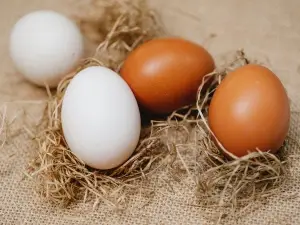
Waiting for your chicks to break through the shell can be a nerve-wracking experience. You can’t truly know if your bird is healthy or not if the bird hasn’t hatched.
If you’re worried because your chick has broken through the shell, but not the membrane, this article is for you.
If your chick has broken through its shell, but not through the membrane, you can create a safety hole in the shell as a way of helping it along the process.
Table of Contents
Chick broke shell but not membrane
Chicks can sometimes break through the eggshell without breaking through the membrane, this isn’t a disaster and your bird will still be able to breathe even though it hasn’t hatched.
This happens on occasion and the bird will hatch with a little help.
Why this happens:
A dry membrane can cause a chick to break through its shell, but not the membrane. Eggs need humidity, humidity keeps the egg’s membrane from becoming dry and sticking to the bird.
The humidity also keeps the membrane wet enough, and thus soft enough, for the bird to hatch through. A dry membrane will be quite tough and rubbery. If the membrane isn’t moist enough, the bird may be able to break through the shell, but not the membrane.
What to do
If the bird is still breathing, still chirping, and has recently pipped then you don’t have to do anything for now. Birds can take up to 24 hours to hatch from when they last pipped. Read more about that here.
If your bird is still early in its hatching journey then you can leave the bird alone and let it hatch on its own.
If the bird is not making any chirping sounds anymore or if the sounds are starting to become weaker and less frequent then you may need to intervene.
If the sounds are getting weaker this may mean that the bird is exhausted from trying to hatch and may be giving up sometime soon. If it gives up trying to hatch, it will eventually die in the egg.
The chick will run out of air if it does not get any fresh air into the egg. If the chick pops the air sac, and uses up all the air from the air sac, then it can suffocate if it doesn’t hatch and breathe fresh air.
You can make a safety hole in the egg to make sure that the bird gets air, adding some water to the membrane will help the bird hatch out of the shell. Creating a safety hole and helping the bird hatch may just save its life.
How to create a safety hole in the egg:
A safety hole is a small hole made on the eggshell, this will get air into the eggshell and help the bird breathe. Making a safety hole may be all the help a chick needs to hatch on its own.
You can make the safety hole in the egg if there is no progress for 18-24 hours after the first pip.
Make the hole towards the bottom of the eggshell, that is, the blunt end of the egg. This is where the air sac is. You may want to candle the egg to see exactly where your egg’s air sac is.
Once you’ve found the air sac, you can go ahead and make the safety hole. Use a small sharp screw to do this.
Twist the screw into the egg in a back and forth motion to create the hole. Use light pressure to do this and go as slowly as you need to in order to control the screw.
Your screw will slowly begin to make a hole in the eggshell, the hole only needs to be as big as the tip of the screw. Enough air will be able to enter the egg through a hole of this size.
Place a drop of water into the safety hole making sure it enters the egg and doesn’t block the hole, this water will help the membrane get moist. Only a tiny amount of water is needed to moisten the membrane.
The chick inside the egg can usually take it from here, you can place the egg back in the incubator and let nature take its course.
FAQ:
What is dry hatching?
Dry hatching is when you don’t add water to the incubator, while the eggs are being incubated, and only add water in the last 3 days of incubation.
This is done to prevent the embryo from drowning as it grows in the egg.
How do you know if a chick is in distress?
Signs that indicate that a chick is in distress include making peeping and chirping noises.
These two behaviors are the bird’s way of alerting those around them that there is something wrong, and it’s a way to attract your attention
Conclusion
In conclusion, if the membrane inside of the shell is too dry, it will become rubbery and tough, too tough for the chick to hatch out of. Creating a safety hole and dampening the membrane will help the chick hatch.
If you enjoyed this article then you may also be interested in other chicken related articles. Here are some articles that you may be interested in: Chick Pipped But Didn’t Break Membrane, Bump On My Chickens Head, White Spots On Chickens Head, Chicken Has An Abscess On Its Face, My Baby Chick Keeps Falling Over

